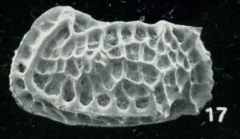WoRMS taxon details
Bradleya solida Whatley, Downing, Kesler & Harlow, 1984
776392 (urn:lsid:marinespecies.org:taxname:776392)
accepted
Species
marine, fresh, terrestrial
Whatley, R.C., Downing, S.E., Kesler, K. and Harlow, C.J. (1984a) New species of the ostracod genus Bradleya from the Tertiary and Quaternary of D.S.P.D.P. sites in the southwest Pacific. Revista Espanola de Micropaleontologia 16, 265–298. [details]
Type locality contained in Lord Howe Rise
type locality contained in Lord Howe Rise [details]
Description Small heavily calcified. Sub-rectangular. Anterior braodly and asymmetrically convex denticulate; extremity below...
Etymology L. Alluding to the solid and robust carapace of this species.
Description Small heavily calcified. Sub-rectangular. Anterior braodly and asymmetrically convex denticulate; extremity below mid-height. Posterior convex to truncate with approximately six to eight short denticles. Dorsal margin straight in RV, concave in LV with anterior hinge ear and short postero-dorsal spine. Ventral margin straight to convex with slight oral concavity. Maximum length below mid-height, maximum height at anterior cardinal angle; maximum width in posterior third. Coarsely reticulate. Ventro-Iateral ridge strong, continuous around anterior margin into ocular ridge without sig nificant decrease in width or relief. Dorsal ridge strong, non-spinose. Bridge sub-rectangular with rather irregular dorsal and ventral marginal muri. Remainder of reticulum with relatively few bold, rounded muri, bounding large, open, moderately shallow fossae. Muri of equal horizontal and vertical emphasis with a few, generally horizontal, secondary muri. Fossae rectangular in postero-median reticular field with characteristic quadrangular pattern of the group. Normal pore canals distribution and internal features as for the genus with some 10 marginal pore canals anteriorly. Median element of hinge in RV in locellate groove, posterior tooth bilobed. [details]
Etymology L. Alluding to the solid and robust carapace of this species.
Etymology L. Alluding to the solid and robust carapace of this species. [details]
Brandão, S.N.; Antonietto, L.S; Nery, D.G.; Pereira, J.S.; Praxedes, R.A.; Santos, S.G.; Karanovic, I. (2024). World Ostracoda Database. Bradleya solida Whatley, Downing, Kesler & Harlow, 1984. Accessed through: World Register of Marine Species at: https://www.marinespecies.org/aphia.php?p=taxdetails&id=776392 on 2024-11-15
Date
action
by
![]() The webpage text is licensed under a Creative Commons Attribution 4.0 License
The webpage text is licensed under a Creative Commons Attribution 4.0 License
original description
Whatley, R.C., Downing, S.E., Kesler, K. and Harlow, C.J. (1984a) New species of the ostracod genus Bradleya from the Tertiary and Quaternary of D.S.P.D.P. sites in the southwest Pacific. Revista Espanola de Micropaleontologia 16, 265–298. [details]
 Present
Present  Present in aphia/obis/gbif/idigbio
Present in aphia/obis/gbif/idigbio  Inaccurate
Inaccurate  Introduced: alien
Introduced: alien  Containing type locality
Containing type locality
From editor or global species database
Description Small heavily calcified. Sub-rectangular. Anterior braodly and asymmetrically convex denticulate; extremity below mid-height. Posterior convex to truncate with approximately six to eight short denticles. Dorsal margin straight in RV, concave in LV with anterior hinge ear and short postero-dorsal spine. Ventral margin straight to convex with slight oral concavity. Maximum length below mid-height, maximum height at anterior cardinal angle; maximum width in posterior third. Coarsely reticulate. Ventro-Iateral ridge strong, continuous around anterior margin into ocular ridge without sig nificant decrease in width or relief. Dorsal ridge strong, non-spinose. Bridge sub-rectangular with rather irregular dorsal and ventral marginal muri. Remainder of reticulum with relatively few bold, rounded muri, bounding large, open, moderately shallow fossae. Muri of equal horizontal and vertical emphasis with a few, generally horizontal, secondary muri. Fossae rectangular in postero-median reticular field with characteristic quadrangular pattern of the group. Normal pore canals distribution and internal features as for the genus with some 10 marginal pore canals anteriorly. Median element of hinge in RV in locellate groove, posterior tooth bilobed. [details]Diagnosis A small, heavily-calcified species of Bradleya with a robust and well developed reticulum. Ventro-Iateral and ocular ridges of almost equal relief and strength. Dorsal ridge nonspinose. Bridge irregularly sub-rectangular. Muri bold and rounded of moderately high relief bounding shallow sub-rectangular fossae. Secondary muri generally horizontal. Median element of hinge crenulate. Approximately 10 marginal pore canals anteriorly. [details]
Etymology L. Alluding to the solid and robust carapace of this species. [details]

